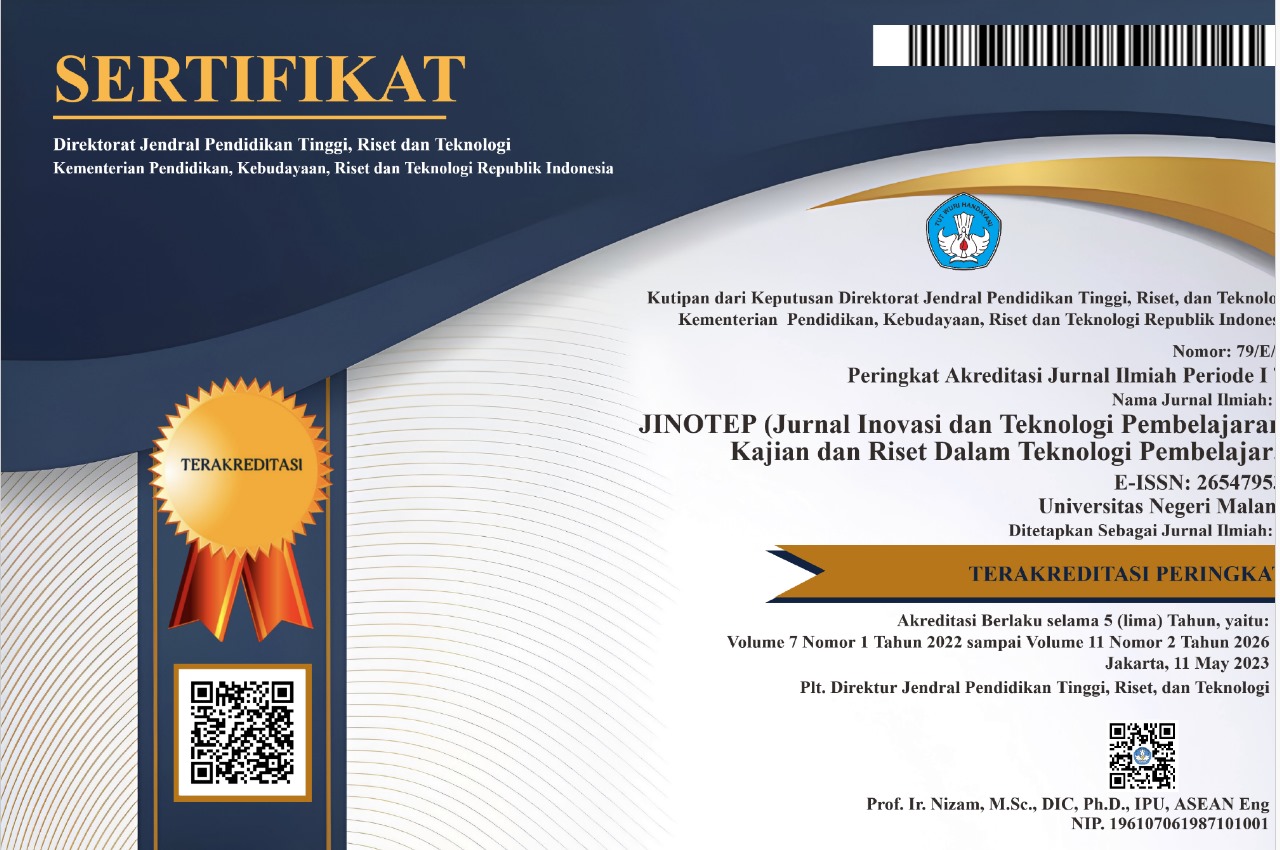Analisis Faktor-Faktor Kesuksesan E-Learning dalam Meningkatkan Proses Belajar Mengajar Di Universitas Telkom
Abstract
Abstrak: Dalam rangka mengantisipasi fenomena belajar daring yang terus berkembang, Universitas Telkom melakukan uji coba kuliah secara blended learning. Hal tersebut penting dilakukan untuk meningkatkan kesuksesan implementasi e-learning. Penelitian ini bertujuan untuk mengetahui Faktor-faktor apa sajakah yang mempengaruhi kesuksesan implementasi e-learning. Sampel pada penelitian ini adalah 88 orang mahasiswa yang mengambil mata kuliah E-Commerce dan Data Management yang merupakan mata kuliah uji coba blended learning berbasis platform e-learning CELOE di Fakultas Ekonomi dan Bisnis Universitas Telkom. Alat pengumpulan data berupa kuesioner disebarkan secara online dan kemudian diolah menggunakan teknik analisis PLS-SEM. Hasil penelitian ini menunjukkan bahwa kualitas sistem berpengaruh terhadap penggunaan sistem e-learning, namun tidak berpengaruh terhadap kepuasan pemakai, kualitas informasi berpengaruh terhadap penggunaan sistem dan kepuasan pemakai, efikasi diri berpengaruh terhadap penggunaan sistem, namun tidak berpengaruh terhadap kepuasan pemakai, efikasi diri berpengaruh terhadap budaya belajar, namun tidak berpengaruh terhadap kesuksesan e-learning, penggunaan sistem berpengaruh terhadap kepuasan pemakai, dan kesuksesan e-learning, kepuasan pemakai berpengaruh terhadap kesuksesan e-learning, budaya belajar berpengaruh terhadap kepuasan pemakai dan budaya belajar berpengaruh sedang terhadap kesuksesan e-learning. Hasil-hasil penelitian tersebut menunjukkan bahwa faktor-faktor kualitas sistem, kualitas informasi dan efikasi diri dapat digunakan untuk meningkatkan kesuksesan implementasi e-learning.
Abstract: To anticipate the phenomenon of online learning that continues to grow, Telkom University conducts lecture trials using blended learning. This process is important to increase the successfulness of e-learning implementation. This study aims to investigate what factors influence the successful implementation of e-learning. The sample in this study were 88 students who took the E-Commerce and Data Management courses which are the trial courses for blended learning based on the CELOE e-learning platform at the Faculty of Economics and Business, Telkom University. Data collection tools are questionnaires distributed online and then processed using the PLS-SEM analysis technique. The results of this study indicate that the quality of the system affects the use of the E-Learning system, but has no effect on user satisfaction, the quality of information affects the use of the system and user satisfaction, self-efficacy affects the use of the system, but does not affect user satisfaction, self-efficacy affects the learning culture, but does not affect the success of e-learning, the use of the system affects user satisfaction, and the success of e-learning, user satisfaction affects the success of e-learning, learning culture affects user satisfaction and learning culture has a moderate effect on the success of e-learning . The results of this study indicate that the system quality, information quality and self-efficacy factors can be used to increase the success of e-learning implementation.
Keywords
Full Text:
PDFReferences
Aldholay, A., Issac, O., Zaini, A., Abdulsalam, R., & Al-Shibami, A. . (2018). An Extension of Delone and McLean IS Success Model with Self-Efficacy Online learning Usage In Yemen. The International Journal of Information and Learning Technology, 35(4), 285–304. https://doi.org/https://doi.org/10.1108/IJILT-11-2017-0116
Aritantia, Y., Muslim, S., Wibowo, T. W., Rijanto, T., & Cholik, M. (2021). Kajian Literatur Sistematis Blended Learning dalam Meningkatkan Motivasi dan Hasil Belajar Siswa SMK. Jurnal Inovasi Dan Teknologi Pembelajaran, 8(2).
Bandura, A. (1997). Self-efficacy: The exercise of control. W H Freeman/Times Books/ Henry Holt & Co.
Chopra, G., Madan, P., Jaisingh, P., & Bhaskar, P. (2019). Effectiveness of E-learning portal from students’ perspective: A structural equation model (SEM) approach. Interactive Technology and Smart Education, 16(4).
Cidral, W. A., Oliviera, T., Di Felice, M., & Aparicio, M. (2018). E-learning success determinants: Brazilian empirical study. Computers and Education, 122, 273–290.
Daar, G. F., & Nasar, I. (2021). Teachers Challenges in The Learning Process During The Covid-19 Pandemic in Rural Areas. Jurnal Inovasi Dan Teknologi Pembelajaran, 8(2), 186–193.
DeLone, W. H., & McLean, E. R. (2003). The DeLone and McLean Model of Information Systems Success: A Ten Year Update. Journal of Management Information Systems, 19(4), 9–30.
Dewi, I. K., & Zaky, A. (2020). Faktor-Faktor yang Mempengaruhi Penggunaan E- Learning Systems dalam Proses Belajar Mahasiswa Universitas Brawijaya. Jurnal Ilmiah Mahasiswa FEB Universitas Brawijaya, 7(2), 1–38.
Doll, W. J., & Torkzadeh, G. (1998). Developing A Multidimensional Measure of Systems Use In An Organizational Context. Information & Management, 33(4), 171–185. https://doi.org/https://doi.org/10.1016/S0378-7206(98)00028-7
Estriegana, R., Medina-Merodio, J. A., & Barchino, R. (2019). Student acceptance of virtual laboratory and practical work. Computers and Education, 135, 1–14.
Feist, J., & Gregory, J. (2006). Theories of Personality (Sixth). McGraw-Hill Companies.
Fornell, C., & Larcker, D. . (1981). Evaluating Structural Equation Models with Unobservable Variables and Measurement Error. Journal of Marketing Research, 18(1), 39–50.
Hamdani. (2011). Strategi Belajar Mengajar. CV. Pustaka Seti.
Hernita, S. J., Sidik, W., & Sanjaya, V. F. (2020). Pengaruh E-Service dan Kualitas Sistem terhadap Kepuasan Pengguna Sistem E-Learning dengan Moderasi Perceived Value. Target: Jurnal Manajemen Dan Bisnis, 2(2), 257–264. https://journal.universitasbumigora.ac.id/index.php/target/article/view/1001
Isaac, O., Abdullah, Z., Ramayah, T., & Mutahar, A. M. (2017). Examining the relationship between overall quality, user satisfaction and internet usage: an integrated individual, technological, organizaional and social perspective. Asian Journal of Information Technology, 16(1), 100–124.
Ithriah, S. A., Ridwandono, D., & Suryanto, T. L. M. (2020). Online Learning Self-Efficacy: The Role in E-Learning Success. Journal of Physics: Conference Series, 1569(2). https://doi.org/10.1088/1742-6596/1569/2/022053
Jogiyanto. (2008). Analisis dan Desain Sistem Informasi: Pendekatan Terstruktur Teori dan Praktek Aplikasi Bisnis. Penerbit Andi.
Juliana, I. P., Utami, I. G. . L. P., & Utami, I. A. M. I. (2021). Challenges in Operating University Moodle E-Learning: A Case Study From Lecturers’ Perceptions. Jurnal Inovasi Dan Teknologi Pembelajaran, 8(1).
Kock, N. (2014). Advanced Mediating Effects Tests, Multi-group Analysis, and Measurement Model Assessments in PLS-based SEM. International Journal of E-Collaboration, 10(3), 1–13.
Kock, N. (2020). Warppls User manual: Version 7.0. ScriptWarp Systems: Laredo.
Kock, N., & Lynn, G. S. (2012). Lateral Collinearity and Misleading Results in Variance-Based SEM: An Illustration and Recommendations. Journal of the Association for Information Systems, 13(7), 546–580.
Kurt, Ö. E. (2019). Examining an e-learning system through the lens of the information systems success model: Empirical evidence from Italy. Education and Information Technologies, 24(2), 1173–1184.
Lee-Post, A. (2009). E-Learning Success Model: An Information Systems Perspective. Electronic Journal of E-Learning, 7(1), 61–70.
Liaw, S.-S., & Huang, H.-M. (2013). Perceived satisfaction, perceived usefulness and interactive learning environments as predictors to self-regulation in e-learning environments. Computers and Education, 60(1), 14–24.
Martins, J., Branco, F., Gonçalves, R., Au-Yong-Oliveira, M., Oliveira, T., Naranjo-Zolotov, M., & Cruz-Jesus, F. (2019). Assessing the success behind the use of education management information systems in higher education. Telematics and Informatics, 38, 182–193.
Maudiarti, S. (2018). Penerapan E-Learning Di Perguruan Tinggi. Perspektif Ilmu Pendidikan, 32(1), 51–66. https://doi.org/10.21009/pip.321.7
Nawaz, S. S. (2019). Effectiveness of LMS:Moodle Perspective fromSouth Eastern University of Sri Lanka. International Journal of Grid and Distributed Computing, 12(3), 172–189.
Nunnally, J. C., & Bernstein, I. H. (1994). Psychometric Theory. McGraw-Hill Companies.
Ong, C.-S., Day, M.-Y., & Hsu, W.-L. (2009). A Measurement of User Satisfaction with Question Answering Systems. Information & Management, 46(7), 397–403.
Ramirez-Correa, P. E., Rondan-Cataluna, F. J., Arenas-Gaitan, J., & Alfaro-Perez, J. L. (2017). Moderating effect of learning styles on a learning management system’s success. Telematics and Informatics, 34(1), 272–286.
Safsouf, Y., Mansouri, K., & Poirier, F. (2020). An analysis to understand the online learners’ success in public higher education in Morocco. Journal of Information Technology Education: Research, 19, 87–112.
Saied, H. (2017). The Impact of Simulation on Pediatric Nursing Students’ Knowledge, Self-efficacy, Satisfaction, and Confidence. Journal of Education and Practice, 8(11).
Santoso, B., & Legowo, N. (2015). Faktor-faktor Kesuksesan E-Learning dalam Meningkatkan Proses Belajar Mengajar di SMA Budi Mulia Karawang. Academia.
Schwieger, D., & Ladwig, Ch. (2018). Reaching and Retaining the Next Generation: Adapting to the Expectations of Gen Z in the Classroom. Information Systems Education Journal, 16(3).
Seliana, N., Suroso, A. I., & Yuliati, L. N. (2020). Analisis Keberhasilan Penerapan E-Learning di Fakultas Teknik Universitas Riau. Jurnal Aplikasi Bisnis Dan Manajemen, 6(2), 369–378. https://doi.org/10.17358/jabm.6.2.369
Suganda, T. (2018). Pengelolaan Pembelajaran Generasi Z. Research Gate, 1–11.
Tafiardi. (2005). Meningkatkan Mutu Pendidikan Melalui E-Learning. Jurnal Pendidikan Penabur, 4(4), 85–97.
Wei, H.-C., & Chou, C. (2020). Online learning performance and satisfaction: do perceptions and readiness matter? Distance Education, 41(1), 48–69.
Wood, R., & Bandura, A. (1989). Impact of Conceptions of Ability on Self-Regulatory Mechanisms and Complex Decision Making. Journal of Personality and Social Psychology, 56(3), 407–415.
Yuliantoro, H. R. (2015). Analisis Faktor-Faktor uang Mempengaruhi Kepuasan Penggunaan Aplikasi E-Learning dengan Pelayanan Staf Pengajar sebagai Variabel Intervening. Seminar Nasional Teknologi Informasi Dan Komunikasi. Paper presented at Seminar Nasional Teknologi Informasi dan Komunikasi 2015 (SENTIKA 2015), Yogyakarta, 28 Maret 2015 (pp. 57-64).
DOI: http://dx.doi.org/10.17977/um031v8i22021p194
Refbacks
- There are currently no refbacks.
Copyright (c) 2021 Fetty Poerwita Sary, Adhi Prasetio, Milleniartha Moslem

This work is licensed under a Creative Commons Attribution-ShareAlike 4.0 International License.
======================================================================
Jurnal Inovasi dan Teknologi Pembelajaran published by Universitas Negeri Malang in collaboration with the Asosiasi Program Studi Teknologi Pendidikan Indonesia (APS TPI) and Ikatan Profesi Teknologi Pendidikan Indonesia (IPTPI) with a MoU.
Publisher Address:
Educational Technology Laboratorium, Building D5, 1st Floor
Faculty of Education, Universitas Negeri Malang
Semarang St. No. 5, Malang City, East Java Province, Postal Code 65145
Email: jinotep.fip@um.ac.id
======================================================================

JINOTEP is licensed under a Creative Commons Attribution-ShareAlike 4.0 International License.
JINOTEP Statistics (Since July 13th, 2020)



.png)




.png)
1.png)
1.png)
4.png)
2.png)
1.png)
1.png)
.png)


_3.png)





1.png)
.png)